- Home
- Alicia Scott
Marrying Mike...Again Page 7
Marrying Mike...Again Read online
Page 7
He got out of the car, opened her door for her and walked her to the door. Her hands were fumbling uncharacteristically with her purse. He took the Coach bag from her grip and dug out her keys himself.
“I’m fine,” she said now.
“Sure.”
“No, really, I’m fine.”
“Ma chère, we both know fine is my word, not yours. Why don’t you have a seat on the couch.”
He tossed her bag negligently onto her glass hall table and, without bothering to look back, headed for the marble wet bar. He might not be Sandy’s husband anymore, but he remembered what she drank. A perfect V.O. Manhattan, served neat with a twist. Koontz had practically fallen over laughing the first time she’d tried to order it at the Code Blue, the local cops’ bar. Sandy, of course, did not drink beer. For the Code Blue, however, she’d finally learned to stomach very bad whiskey.
Tonight, Mike mixed two Manhattans. What the hell.
He found Sandra sitting on her pale, L-shaped sofa. She’d dumped her blazer over the back of the sofa, kicked off her black leather heels and finally yanked out her hair clip. Now she sat with one leg curled beneath her and her head resting on her braced arm. Her chestnut hair was loose and curly, the way he liked it. Her white silk shirt was unbuttoned down to the top of her brocade vest, revealing tantalizing glimpses of satiny skin and a lace edged bra. Her stockinged feet were tiny and somehow vulnerable. He used to rub those feet. He used to paint those toenails.
His throat closed up on him. His body went rock hard. He handed Sandra her drink and made it a point to sit several feet away. Apparently, some things didn’t change, including Sandra Aikens’s impact on his libido.
“Nice,” she murmured after a moment, taking a first sip of the Manhattan and getting some badly needed color in her cheeks. “You remembered.”
“Making a Manhattan is like riding a bike,” he assured her, and was rewarded by a wan smile and even more color in her cheeks. He tried his own drink and welcomed the slow burn sliding down his throat.
“Mike, what was going on tonight? What was all that talk of ricochet?”
“Not too smooth, huh?”
“No, not smooth at all.” She was frowning at him. Worse, she was looking genuinely hurt and he never could stand to see her hurt. “I don’t get it. I honestly want to help Officers Fletcher and Johnson. I feel for what they went through tonight. I can’t imagine anything worse. And yet…and yet I was treated as the enemy,. Things were going on they obviously had no intention of telling me about. How am I supposed to help them if they won’t talk to me?”
“You are the outsider, ma chère. You come from the wrong side of the blue wall. Cops, by nature, aren’t supposed to trust.”
“So how do I get over it? You tell me that forcing my way into their world will only alienate me further. Tonight I tried being supportive and understanding, but that got me nowhere. So what do I do?”
“It takes time, ma chère. You’ll learn as you go, and one day you’ll realize you’re no longer studying cops, but actually thinking like one. You’ll use too much lingo, talk in code. You’ll find yourself looking down at outsiders, thinking they don’t have a clue about how the world really works, and then you’ll know you’re a cop.”
“And I’ll know about ricochet?”
“Lower leg injuries, Sandy. You’ll know about lower leg injuries.”
She frowned harder, not getting it, and then suddenly—her eyes opened wide. “He shot himself! Good God, Fletcher shot himself! Trying to unholster his gun, right? Oh, my God, I need to do something about that.”
“No Sandy, you need to do nothing about that.”
“Mike, we can’t have officers running around shooting themselves in firefights. Obviously we need more training, or better equipment. I’ve been reading articles on holsters that are easier to unsnap. Plus there’s the whole issue of trigger weight. Maybe he had his gun set too light. I was reading that officers should have heavier triggers so they have to consciously and forcibly squeeze off the first shot—”
Mike set down his Manhattan. He looked his ex-wife in the eyes, and as close as he ever came to reprimanding her, he said levelly, “You say one word on the subject, Sandra, and no man on the force will ever take your order again. And I’ll have to be one of them.”
She drew up short, looking genuinely startled. “Mike?”
He sighed. Lord, she was killing him. He wished she’d never taken this cockamamy job, never forced his worlds to collide. It was confusing the hell out of him. It was giving him a headache.
“Koontz said something today, and God knows I hate to give anything he says too much credit, but maybe he was right. Koontz said the difference between men and women is that men let each other be, while women gotta run around changing everything.”
“Nothing personal, Mike, but Koontz’s opinions mean about as much to me as the village idiot’s.”
“Listen, Sandy. Koontz’s point is that some things you have to let go. Fletcher is one of them. You say something, you overhaul training, anything, and you’re going to humiliate the man. And don’t ask me to explain it, but in the Alexandria locker-room world, it’s a bigger crime to embarrass a man than to try to prevent him from hurting himself. You were told ricochet. You want to earn points now, you repeat to every Tom, Dick and Harry you ever met that it was ricochet. That will buy you respect. Improving us, on the other hand, won’t. Go figure.”
“Be part of the problem, not the solution?”
“Be part of the unit, and not the outsider looking in.”
Sandra was quiet. He knew such concepts went against her grain, but she appeared to be giving it genuine thought. Abruptly she nodded. “Thank you, Mike.”
“For telling you how evil we really are?”
“For telling me the truth.” She shrugged, giving him an unexpected smile. “I know sometimes I’m too dogmatic, Mike. I come on too strong. I get lost in my righteousness, I guess. But I want to learn. I’m thirty-four-years old. I should know by now how to adapt. The world is a complex place. And being a cop is a complex job. It’s good for me to think of those things.”
“Some of it’s PR,” Mike commented softly. “That’s what Koontz was trying to say. Cops encounter lots of dangerous situations and dangerous people. We want mystique on our side. You admit that in a firefight, we shoot ourselves with our own guns. Hell, there’s no voodoo there. You say we want to understand, communicate, heal people who threaten us, there’s no voodoo there, either. You can train us to act kinder and gentler—maybe that is what we need—but cops like Koontz simply don’t want to look kinder and gentler. That’s the difference.”
“Ricochet.”
“Yeah. Ricochet.”
“Mike,” she said softly, no longer meeting his gaze. “I think you’d better go now. Maybe it’s the Manhattan. Or maybe it’s because we finally agree….”
“Too late, ma chère. I already want to stay.”
He closed the space between them effortlessly. He dipped his hand beneath the curly veil of her hair. The first touch of his rough palm against her smooth cheek was electric. He could watch his impact in her big blue eyes now. The growing desire, the doubt and confusion warring in her gaze. He understood it. He felt the same. The overpowering need for the one woman who’d always stirred his blood. The sad, relentless knowledge that they’d been down this road once before, and it had simply hurt them both.
And yet, at times like this, it seemed like such a shame to not even try.
He dipped his head lower. He inhaled the delicate scent of her fine, upscale perfume. He watched her lips part.
“Mike?” she whispered again, part a protest, part a plea.
“Shh. Stop thinking of all the ways we were wrong for each other, Sandy, and let me show you all the ways we were right.”
He kissed her. His blood was thundering in his ears, his body straining against his pants. He’d thought the kiss would be hungry and fierce, a four-year-old desire burs
ting into flame. But his lips were curiously soft on hers, coaxing. He nibbled the corner of her mouth, nothing more, nothing less, waiting for that welcoming sigh. And then it came. She turned toward him, her body arching into his, and he felt triumphant.
His hands were suddenly gripping her head, angling it back so he could deepen the kiss. And her mouth was open beneath his, her fingers digging into his shoulders, her breasts brushing his chest. He tasted whiskey and desire. He suckled her bottom lip, dueled with her tongue and delved deep into her mouth. He tasted home. He tasted everything he had ever wanted. He tasted the promise of so many future nights.
Then Sandra was pushing him away.
“No. Don’t. No.”
She bounded off the sofa before he could catch her arm. Her motions were jerky and agitated. What struck him most when she turned back around, however, was that her eyes glistened with tears.
“I’ve spent four years, Mike,” she whispered hoarsely, “four long years, getting you out of my system. I don’t want you back. I can’t afford to have you back.”
“Why not? You felt it, too—”
“Of course I felt it! For God’s sake, sex was never our problem. You could look at me across the room and I’d burst into flame. Hell, I had to sell my car because I couldn’t stand the memories. But what about afterward, Mike? What about outside of the bedroom? What about real life?”
He was taken aback by her words. Hurt. It made him stubborn and defensive. “Today was real life. We didn’t do so badly.”
“Oh, I see. One conversation and we’re magically rehabilitated. Maybe if more people had gotten shot during our marriage we would’ve been all right.”
“Hey, it’s a start!”
“Down the long road to nowhere.”
“Sandy, what do you want from me!”
“I don’t know! I…just… You need to go home now, Mike. I want you to go home.”
“Fine.” He said the word more savagely than he intended. He got off the sofa forcefully. Blood was still pounding in his veins. His pants were too tight. And he was angry and confused. Hell, he didn’t know what he wanted either, except then he looked at Sandy with her pale skin and curly hair and his desire took over his brain again. Seduce her and be done with it. All divorced couples relapsed at least once. Maybe it would get them out of each other’s system. Maybe it would ease this ache in his chest.
He took a step forward. She cut him off at the pass.
“You walked away easily enough once before, Mike,” she said lowly. “Don’t tell me it’s difficult now.”
“I didn’t walk away, ma chère. You did.”
“You never tried to stop me.”
“Yeah, like I was ever able to change your mind.”
“Exactly! And here we go. All discussions lead to war. All wars lead to bed. All beds lead to a morning after, where we are right back where we started. I’m thirty-four years old, Mike. I can’t afford another roller-coaster ride. I want a family, you know. I want children and college funds and retirement funds and growing old with someone at my side. I need a life mate, not a bedmate. I need someone other than you. I’m sorry, Mike, but it’s true. Now go home. We can pretend this never happened, and then tomorrow at the office we’ll finally have something together.”
“Co-workers for life?” he snarled.
She said quietly, “It’s more than we had before.”
Mike turned away. He jammed his hands into his back pockets and exhaled shortly. She was right, and he hated that. Co-workers. It sounded so flat. Especially after that kiss, after having her in his arms once more. And that hadn’t had anything to do with lust, though he didn’t know how to tell her that. That had been about finally feeling right.
At the brink of leaving, he had to ask her one last question. It mattered to him, mattered to him more than it should.
“Why did you do it, Sandy? Why did you really become the chief of police?”
She opened her mouth. He could tell from the hostile look in her eyes that she was going to give him the pat answer. New challenge, expanding her horizons…
But something in her suddenly gave way. Her gaze softened, became more somber. Became haunting.
“Because I wanted to finally understand this precious world of yours, Mike. Because for one year I was married to a cop who would never tell me anything about his day other than it was fine. With Rusty you would talk for hours. With me, everything was a one-word platitude. So here I am. I’m part of your world now, and you finally have to talk to me about policing, don’t you? You finally have to tell me about your day.”
“Yeah,” Mike said. “Yeah.”
But his words were not soft or apologetic, they were harsh. They were hurt. Mike didn’t think he should have to talk to his wife about the dirt he saw in his day. What was the point of making the world a better place if he brought the contamination into his home? His wife should trust him to be keeping the world safe.
But of course, fierce Sandra Aikens never trusted anyone, not even him.
Mike picked up his coat. He headed out the door.
This time, he did not look back.
Chapter 5
Letter to the Editor
April 19
Editor’s Note: This is the second letter sent by “Vee” to the Citizen’s Post. Police have confirmed the shooting on Main Street at approximately 6 o’clock last night [see story, page A-1]. The police have also issued a statement encouraging Vee, or anyone who knows Vee, to please come forward [see box, page A-1]. For as long as this crisis continues, we feel it is our duty to print these letters to both encourage communication and inform the community. Once again, these letters express the view of the writer, not the staff of the Citizen’s Post.
Members of the Man:
Had you in my sight last night. Lined up the shot real nice. Be thinking about who to do first, when I decided whut the hell. I did the car. Lit it up like the Fourth of July. Sat there ’n watched it burn. Ask any homeboy around. He’ll tell ya, cars roast up nice.
Went down for a close up. Nobody noticed. Suits like you can go forever without seein’ a kid like me. Unless I leave the east side. Then little old ladies cross the street to get away. Pretty young ladies lock their cars. I ain’t ever hurt a girl. My mama raised me better’n that, I know whats right.
But you don’t care in the west side. You look at my skin, you see a monster, you lock the doors. Ain’t nothing I can do but peel off my own face. I tried that once, long time ago when I was little. Hurt like hell and didn’t change a thing. It’s better to stay in the east side. Homeys’ll just shoot me here and I ain’t got no fear of that. Maybe get me a clostamy bag. Or wheelchair. Or a casket. Ain’t nothing I haven’t seen before. Shootin’ in the end, be more honest.
So tell me, Man. You think you can come into my streets now? You think you be safe?
I got my gun out, Man. Cleanin’ it the way my brother taught me. I be thinkin’ next time, I’m gonna hit more than a damn city car. Then maybe you’ll start listenin’ to me, Man. Then maybe, you finally learn to pay attenshun!
God take good care of my mama. God take good care of my sister. Devil sit on my shoulder, for he be better company for a brother like me.
Vee
Sandra finished reading the letter and crisply folded up the slim morning paper. She took a fortifying sip of strong black coffee, then absently rubbed the back of her neck where her shoulder muscles were already bunched up tight.
It was five-thirty in the morning. The Citizen’s Post had called her about Vee’s letter late last night. She’d called the mayor, who hadn’t been surprised. He’d already spent time since the shooting being inundated by phone calls—from the African-American League, accusing the cops of provoking the attack by entering the east side. From the Chamber of Commerce, demanding to know if police officers were now going to abandon the struggling east-side businesses. From the East-Side First Congregational Church, quietly informing the mayor that if the police exercised
any undue violence against a troubled thirteen-year-old boy, they’d bring the American Civil Liberties Union down upon his white middle-class male head.
Mayor Peterson was not amused.
Neither was Sandra. The situation was volatile, she agreed. Of course, they would resume regular patrols of the area. In fact, they would double up patrol cars, adding a lookout vehicle for the officers’ protection. They would exercise caution and try to show restraint. But they would not abandon the east-side businesses or community members. They could not let a thirteen-year-old boy hold the police department hostage.
Mayor Peterson had said simply, it wasn’t enough.
Getting up from the kitchen table, depositing her coffee cup in the sink, Sandra knew the mayor was right. She needed a more aggressive plan of action.
She needed to be doing more to manage her ex-husband, Mike.
His kiss last night. Slow, persuasive, melting. One hundred percent Mike Rawlins. Oh, God, she had missed those kisses. And the way he used to hold her, solid against his broad, hard chest, until she could feel herself fold into his frame, surrendering herself to the total possession of his embrace. He was the only man she’d ever met who could make her feel small and delicate. The only man who could take on her temper, twist it with a wink and grin and suddenly have her feeling feminine and attractive again. She missed sparring with her ex-husband. Frankly, she missed his body.
After last night’s encounter, her dreams had turned on her, filling with erotic memories of the days that had been. Mike looking into her eyes with that intent Cajun gaze. Mike sliding into her body, hot and sweat slicked, whispering, “How’s that, ma chère? You like that? What about this? And this…”
She’d woken up at five that morning to find her body soaked and her hands in a death grip on the sheets. Still dazed and confused, she’d turned to Mike’s side of the bed, hungrily reaching for him. Then consciousness had returned like a bucket of ice water. The bed was empty. The house was empty. She was alone and the closest she got to fulfillment anymore was the yearning visions of her dreams.

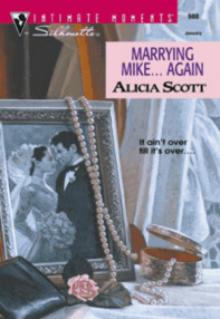 Marrying Mike...Again
Marrying Mike...Again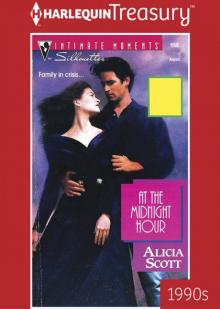 At the Midnight Hour
At the Midnight Hour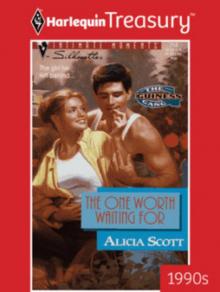 The One Worth Waiting For
The One Worth Waiting For Hiding Jessica
Hiding Jessica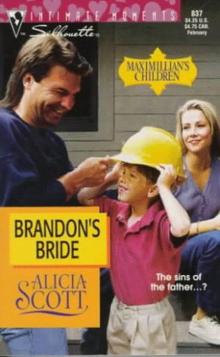 Brandon's Bride
Brandon's Bride Maggie's Man: A Family Secrets
Maggie's Man: A Family Secrets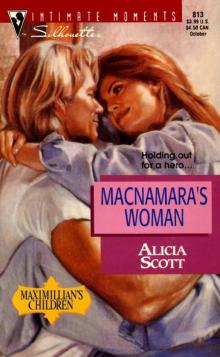 Macnamara's Woman
Macnamara's Woman Partners in Crime
Partners in Crime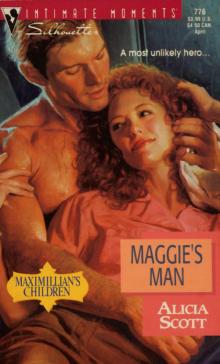 Maggie's Man
Maggie's Man